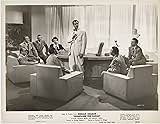Gabriel Heatter(1890-1972)
- Actor
Gabriel Heatter, a radio journalist rivaled only by
Walter Winchell and
Edward R. Murrow in his time,
was born on the Lower East Side of Manhattan to immigrant parents on
September 17, 1890. The family soon moved to Brooklyn, where Heatter
went to school. He was not a good student and found his high school
studies particularly frustrating. However, he was well-spoken,
well-read and had a lively interest in current events.
When he was 16 years old, Heatter harnessed his gift for communication and hit the hustings as a sidewalk campaigner for media baron and Congressman William Randolph Hearst's unsuccessful 1906 run for mayor of New York City. Although Hearst lost the race, his example as a progressive tribune of the people influenced the young Heatter to become a journalist. After graduating from high school, Heatter began working at the "East New York Record," a weekly paper where he reported on social functions. Heatter moved on to the "Brooklyn Times," and while working as a cub reporter for that paper, the Heast Corp. offered him a position as the Brooklyn reporter for The "New York Evening Journal," Hearst's flagship paper in the Big Apple. He accepted.
Heatter became well-known because of a 1931 article published by the liberal weekly "The Nation" in which he argued against the legality of the U.S. Socialist Party. New York radio station WMCA set up an on-air debate between Heatter and a prominent Socialist, and when his opponent failed to show up, Heatter went on the air and discussed his article in more depth. The response was so positive that a larger station, Mutual Broadcasting's WOR, offered him a job as a commentator and reporter. From then on, his career was in radio news.
Heatter became a prominent radio newsman in 1933 when he covered the "Trial of the Century," the trial of Bruno Richard Hauptmann, the German immigrant accused of kidnapping and murdering the child of American hero Charles A. Lindbergh. Now nationally famous, Heatter's commentary began to be a major influence on public opinion, and he became a peer and competitor of powerful radio newsman Walter Winchell. Heatter's heyday was World War II, when his upbeat reporting and commentary was popular with American audiences gloomy over the reversals of fortune in the immediate post-Pearl Harbor period.
In the first half of 1942 the news from the Pacific War was not good. One evening, after the U.S. Navy successfully sank a Japanese destroyer, Heatter came on the air declaring, "There is good news tonight." This became his catch phrase, and one he used throughout his career. He was seen as a morale booster looking for blue skies and silver linings in the dark clouds that comprised much of the news in those days. This optimism and lack of objectivity may be one reason why he is forgotten today, whereas the highly opinionated Winchell and the coldly objective-seeming (though by no means neutral) Murrow live on 'til this day (in Matt Drudge and the Murrow biopic Good Night, and Good Luck (2005), respectively).
When he was 16 years old, Heatter harnessed his gift for communication and hit the hustings as a sidewalk campaigner for media baron and Congressman William Randolph Hearst's unsuccessful 1906 run for mayor of New York City. Although Hearst lost the race, his example as a progressive tribune of the people influenced the young Heatter to become a journalist. After graduating from high school, Heatter began working at the "East New York Record," a weekly paper where he reported on social functions. Heatter moved on to the "Brooklyn Times," and while working as a cub reporter for that paper, the Heast Corp. offered him a position as the Brooklyn reporter for The "New York Evening Journal," Hearst's flagship paper in the Big Apple. He accepted.
Heatter became well-known because of a 1931 article published by the liberal weekly "The Nation" in which he argued against the legality of the U.S. Socialist Party. New York radio station WMCA set up an on-air debate between Heatter and a prominent Socialist, and when his opponent failed to show up, Heatter went on the air and discussed his article in more depth. The response was so positive that a larger station, Mutual Broadcasting's WOR, offered him a job as a commentator and reporter. From then on, his career was in radio news.
Heatter became a prominent radio newsman in 1933 when he covered the "Trial of the Century," the trial of Bruno Richard Hauptmann, the German immigrant accused of kidnapping and murdering the child of American hero Charles A. Lindbergh. Now nationally famous, Heatter's commentary began to be a major influence on public opinion, and he became a peer and competitor of powerful radio newsman Walter Winchell. Heatter's heyday was World War II, when his upbeat reporting and commentary was popular with American audiences gloomy over the reversals of fortune in the immediate post-Pearl Harbor period.
In the first half of 1942 the news from the Pacific War was not good. One evening, after the U.S. Navy successfully sank a Japanese destroyer, Heatter came on the air declaring, "There is good news tonight." This became his catch phrase, and one he used throughout his career. He was seen as a morale booster looking for blue skies and silver linings in the dark clouds that comprised much of the news in those days. This optimism and lack of objectivity may be one reason why he is forgotten today, whereas the highly opinionated Winchell and the coldly objective-seeming (though by no means neutral) Murrow live on 'til this day (in Matt Drudge and the Murrow biopic Good Night, and Good Luck (2005), respectively).




